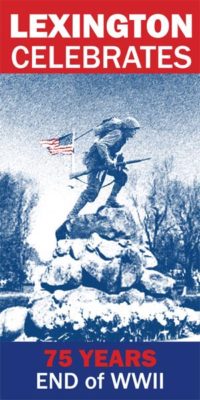
Michael Fiveash and Karen Girondel
Mme. Girondel was a new graduate when she was hired to teach Middle School French in Lexington. “For me, my 20’s were heaven. I started teaching right out of school. I was very lucky. Clarke was a brand new school. All the foreign languages shared a central space. Collaboration is what that school was all about. We learned from the veterans,” she says.
Gigi taught at Clarke until 1984 when she was brought over to the high school to reinvigorate the French 4 classes. “I had never taught French 4, so I just did what I did at Clarke.” French 4 became a very popular class.French 4, French Literature, everything Mme. Girondel taught became popular.
She also revived the french exhange program. Lexington’s connection with Antony, France began at Clarke because a fellow teacher had a friend who taught middle school there. Mme. Girondel brought that connection to the high school and created a very successful exchange program with Antony that continues today and has led to a sister city relationship between the two towns.
Dr. Fiveash had a little more worldly experience before landing at LHS. He spent four years lecturing at Boston University after college. To make ends meet he unloaded trucks, did some sweeping up and tutored. Then a call came from the Lexington schools. “The previous Latin teacher walked out on a Friday and never came back. My intention was to be here a year or two. I fell in love with the school and with teaching high school. By the end of that first year I felt it was something I could do and could get better at.”
Once he gets on this topic, Dr. Fiveash’s passion for teaching at LHS flows easily. “I loved the connection with kids. It was very different from college. I was a young father, I had a one year old. I felt the same thing here. What the Town of Lexington wanted me to do was teach these kids what I love and be a parent/protector.”

Left, Michael Fiveash and Karen Girondel have anchored the Bee Linguists for years.
Their connection with these kids continues long after graduation. You have to know that at any point during a conversation with Gigi and Doc recent alumni will arrive at the door, soaking in the familiar sights of the room that served as “home” for many of them during their years at LHS. Both teachers believe in the importance of this space. Dr. Fiveash notes, “When you walk in, you want to get a sense of what goes on there.” Mme. Girondel adds, “Rooms are so important to how we connect with kids.” Apparently, the students agree. Julie Doherty graduated in 2010 and says, “I’m sure every student who has ever had her remembers learning the subjunctive from Gigi’s Star Wars poster on the wall, which says Que la force soit avec toi,or May the force be with you. Mme. Girondel would be happy to hear that, as she does admit to a particular weakness for that part of speech. When she throws up her hands with a shrug and says, “I just love the subjunctive,” you can understand why her kids love learning it, too.
And, to these rooms, and these teachers, the students return. Dan Choi, Class of 2005 says, “There was this change in the culture at LHS when we came in. I think that’s why I liked coming here. It was old school. The way the history of LHS had been.”
The approach might be old school, but these two are on the cutting edge of teaching technology. Back in Apple II days Dr. Fiveash found a script that would generate random sentences, something that’s very important when you’re teaching a language that no one has spoken for a few thousand years. Then he got the kids involved. “Kids are great natural teachers, especially when teaching technology. They love teaching their elders.” he says. “They love the inverted nature of it.”
Technology has come a long way since then. Through an LEF grant Dr. Fiveash and Mme. Girondel now have high tech “white boards” in their classrooms. Michaela Shtilman-Minkin thinks, “He’s one of the funniest and most sarcastic people I’ve ever known.” So it’s not a surprise to hear him say, “Two of the oldest teachers in the school got the most cutting edge technology! There’s a little irony there.”
His passion for teaching can’t be contained at this point in our interview. He jumps up and turns on the system, gliding into an impromptu Latin lesson that leaves me wondering, Where do I sign up?

Michael Fiveash gives an impromptu demonstration using the Smart Board
Dr. Fiveash and Mme. Girondel see this new technology as an exciting opportunity for the future. “If we can’t teach kids,” Mme. Girondel says, “we’d like to teach teachers how to use this amazing technology.” Dr. Fiveash completes the vision, “The part we’re interested in is the pedagogy. Subjects that really lend themselves to large group instruction.” But the future has to wait. “It’s distracting, all the stuff that’s going on,” he says, “but we both feel like we have to end this the right way.”
In the last few weeks of school they’ve focused on teaching and spent time catching up with returning students. Recently they were immersed in the affection of 150 fellow teachers, students, alumni and parents at a surprise party organized completely by the kids.
And it all comes back to the kids. Ting Ting Shiue and Dan Choi, Class of ’05, stop by the classroom to reconnect with their teacher. In their conversation Ting Ting tells them she now realizes, “It wasn’t about the text or the material, it was about a lot more than that. A lot of the things I took away from the class influence the way I think about what I want to do.” Dan Choi adds, “Obviously, we didn’t understand it at all then, but now we do. You didn’t just teach language and art. You taught us how to live life.”
That is the theme that you hear over and over again from students. That is the legacy that Dr. Michael Fiveash and Karen Girondel leave the students of Lexington High School.
Farewell to Dr. Michael Fiveash and Mme. Karen Girondel.









